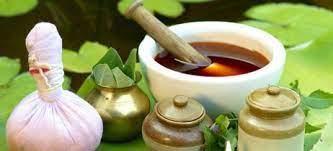Ayurveda, an ancient system of medicine originating from India, emphasizes a holistic approach to health and wellness. Rooted in the belief that a balanced body, mind, and spirit are crucial for well-being, Ayurvedic treatments aim to restore harmony through natural remedies, dietary changes, and lifestyle adjustments. Here’s an overview of some common Ayurvedic treatments:
-
Panchakarma: This detoxification therapy involves five key processes to cleanse the body of toxins (ama) and restore balance. It includes therapeutic vomiting (Vamana), purgation (Virechana), enema (Basti), nasal administration (Nasya), and bloodletting (Raktamokshana). Panchakarma is customized based on individual dosha imbalances.
-
Abhyanga: A full-body oil massage using warm herbal oils, Abhyanga helps improve circulation, reduce stress, and promote relaxation. It nourishes the skin and supports lymphatic drainage, making it a rejuvenating treatment.
-
Shirodhara: This treatment involves gently pouring warm oil on the forehead in a continuous stream. Shirodhara calms the mind, alleviates stress, and improves sleep quality. It’s particularly beneficial for conditions like anxiety and insomnia.
-
Svedana: Herbal steam therapy, or Svedana, is often combined with other treatments to enhance detoxification. It opens the pores, improves blood circulation, and relaxes muscles, helping to relieve tension and stiffness.
-
Nasya: This therapy involves administering medicated oils or powders through the nasal passage. Nasya is effective for sinus issues, headaches, and respiratory conditions. It helps clear the nasal passages and enhances mental clarity.
-
K Panchakarma: A specialized form of Panchakarma that focuses on the treatment of specific conditions such as arthritis, obesity, or skin disorders. This approach tailors the detoxification process to address the root causes of various ailments.
-
Dietary Recommendations: Ayurveda emphasizes the importance of diet in maintaining health. A practitioner may suggest specific foods and herbs based on your dosha to promote balance and wellness. This may include incorporating seasonal fruits, vegetables, and spices like turmeric and ginger.
-
Herbal Remedies: Ayurveda uses various herbs and natural substances to treat specific health issues. Commonly used herbs include Ashwagandha for stress relief, Triphala for digestive health, and Tulsi for its immune-boosting properties.
-
Yoga and Meditation: While not exclusively Ayurvedic, integrating yoga and meditation into your daily routine complements Ayurvedic treatments. These practices enhance mental clarity, reduce stress, and promote physical flexibility.
-
Lifestyle Modifications: Ayurveda advocates for daily routines (Dinacharya) and seasonal routines (Ritucharya) that align with natural rhythms. Recommendations may include sleep hygiene, self-massage, and mindful eating practices.
Ayurvedic treatments focus on individualized care, recognizing that each person has a unique constitution. By addressing the underlying imbalances in the body, Ayurveda promotes long-term health and well-being. If you’re considering Ayurvedic treatments, it’s essential to consult with a qualified practitioner to develop a personalized plan tailored to your needs.
